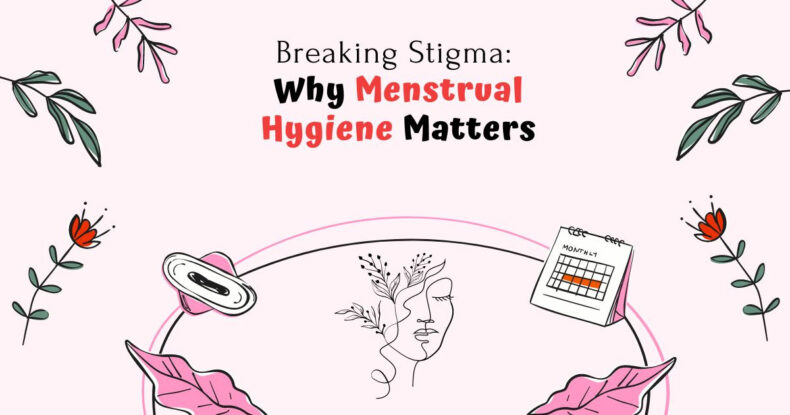Several women have been discreetly leading an initiative to break the taboo around menstruation and promote menstrual health and hygiene throughout the various landscapes of South India.
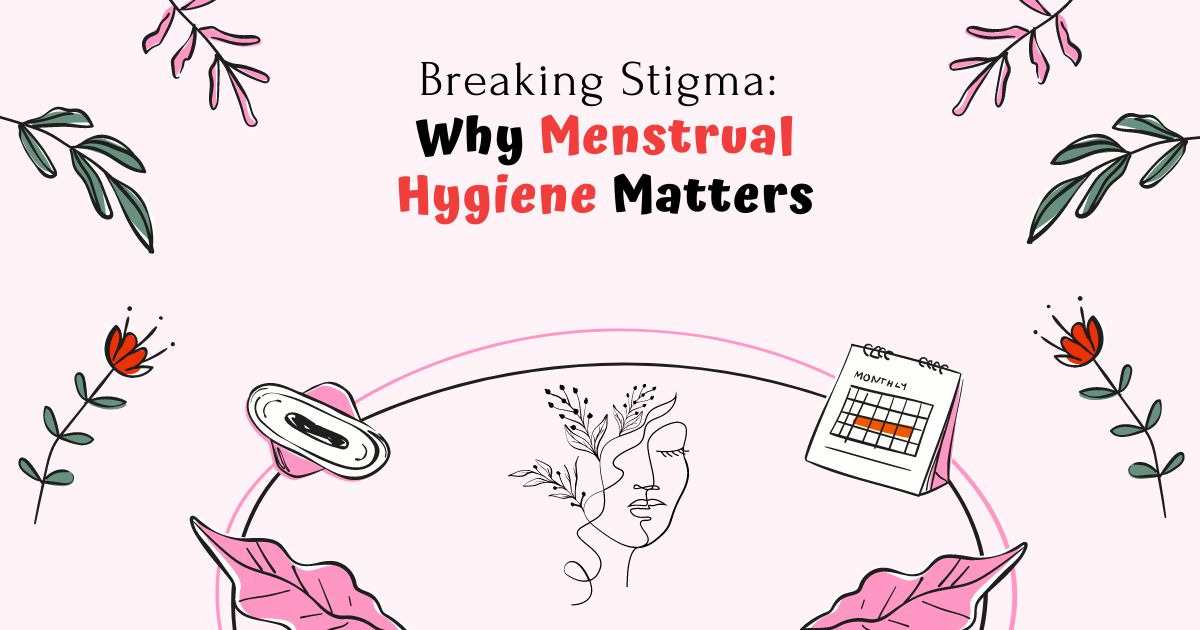
Credits:LearnDrive
Three of the typical ladies who have been going above and beyond to raise awareness about the issue were featured in South First.
For the well-being and empowerment of women and adolescent girls, menstrual health and hygiene (MHH) is crucial. More than 300 million women in the world menstruate every day. A total of 500 million people are thought to be without access to menstruation products and sufficient menstrual hygiene management (MHM) services.
Girls and women need access to WASH facilities, menstrual hygiene products that are affordable and appropriate, knowledge of good practices, and a safe environment where they can manage their periods without embarrassment or stigma to manage their periods effectively.
More than just a fundamental lack of resources or infrastructure is one of the difficulties that girls, women, and other menstruating people confront. Even though most women and girls view menstruation as a natural and healthy part of life, menstruators nevertheless face restrictions in many civilizations because of social stigmas and cultural taboos.
Due to this lack of knowledge, harmful and unclean menstrual practices result, as do misconceptions and unfavourable attitudes that inspire, among other things, bullying, shaming, and even gender-based violence.
Manjula Siddappa Hadpada (Karnataka)
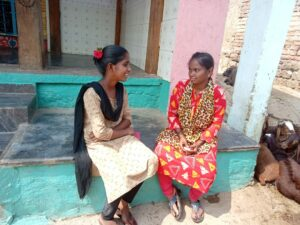
Credits :South First
Meet Manjula Siddappa Hadapada, a 19-year-old barber’s daughter. She has devoted the last three years to raising public awareness of menstruation health.
Manjula was amazed by volunteers from the Karnataka Health Promotion Trust (KHPT), a non-profit organization that leads targeted activities to enhance the health and well-being of communities throughout India after they conducted a session in her school.
Even though there aren’t many taboos about menstruation in my village, Kamanoor, there are a few myths about it and women in our village don’t know much about hygiene. I chose to function as a worker with KHPT. Manjula told South First, “I joined as a Barefoot Counsellor.”
The test was outside the house as well as even inside. She needed to persuade her folks to permit her to visit towns and address ladies, young ladies, and men after school hours — late in the night when the residents got back after work, school, or different commitments.
I wasn’t allowed to stay late at home, but my brother was. I caused a colossal commotion until they consented to allow me to do what I needed to do,” she reviewed.
I began working as a volunteer after my father finally gave in after all of this. She stated, “Now when I am praised for my work in the village, they feel very proud.”
The villages of Kamanoor, Lebageri, Sangapura, Bhimnoor, and Hanumanahalli have all been reached by Manjula’s efforts. In each village, she interacts with approximately 80 women.
Her primary focus is counselling girls between the ages of 12 and 18 and raising awareness about the importance of using sanitary napkins instead of cloth during periods for those over 18.
The women have learned about correct pad disposal techniques from Manjula. They are to collect these pads in a black cover, bring it to the prescribed location, and burn it in an incinerator on the fifth day of their period.
Leaders of the Hanumana halli community have been persuaded by Manjula and her team to ensure that the school has a lavatory facility.
Girls who would refuse to attend class during their menstrual periods made up the majority of absenteeism at the school, which didn’t even have a lavatory facility until only six months ago.
The Tamil woman Neelavathi Shakti
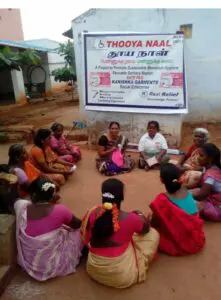
Neelavathi with women in a village in Tamil Nadu (Supplied) Credits: South First
A little tailoring business called Kanishka Garments is having a big impact in the sleepy village of Aravampatti, which is close to Nilakottai in the Tamil Nadu district of Dindigul.
A Paralympian named Neelavathi and her husband Shakthi are in charge of this business.
Shakti thanked Sindhu Naik, the co-founder of Green the Red, a national movement in India that promotes sustainable menstruation, in an interview with South First. “And it is all thanks to Sindhu Naik’s efforts, who initiated the stitching of reusable menstrual cloth pads,” she said.
This made me aware of the risks associated with using disposable sanitary napkins. I was inquired as to whether I would need to elect to have an effect on ladies’ lives and add to natural protection. She stated, “I immediately agreed, and Kanishka Garments began stitching reusable cloth pads under the brand Safe Pad” with support from the non-profit organization Rejuvenate India Movement and Relief India Pvt Ltd.”
She made sense of that the material is produced using microfiber texture treated with an antimicrobial strategy. The pads can be washed and used again for between one and two years.
Although aggressive marketing and distribution programs have made disposable sanitary pads widely available in Tamil Nadu, they have created new issues with sanitary waste disposal.
Telangana’s Shivajyothi Chidura
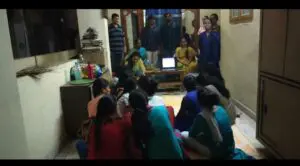
Shivajyothi creating awareness on menstrual hygiene (supplied) Credits :South First
A few years ago, Shivajyothi, a software engineer at Deloitte, had an eye-opening experience when she went to a session on sanitary waste management sponsored by “Saukyam Reusable Pads,” an Amritanandamayi initiative.
Shivajyothi decided to join Amma’s project and actively promote reusable pads after feeling motivated by the cause.
Shivajyothi discovered during her trips to various Telangana villages, schools, colleges, and offices that many women were unaware of the issues with conventional sanitary napkins.
Additionally, she discovered a lack of awareness regarding hygiene practices and numerous taboos regarding menstrual health.
Shivajyothi confronted difficulties while tending to feminine cycle-related points in study halls. Because discussing pads and periods made some women feel uneasy, she was frequently asked to ask male students to leave.
Courageous, Shivajyothi continue, expecting to end the quietness and give important information to all. She comprehended that the feminine cycle was as yet thought to be an untouchable subject, and a piece of her central goal was to change this insight.







